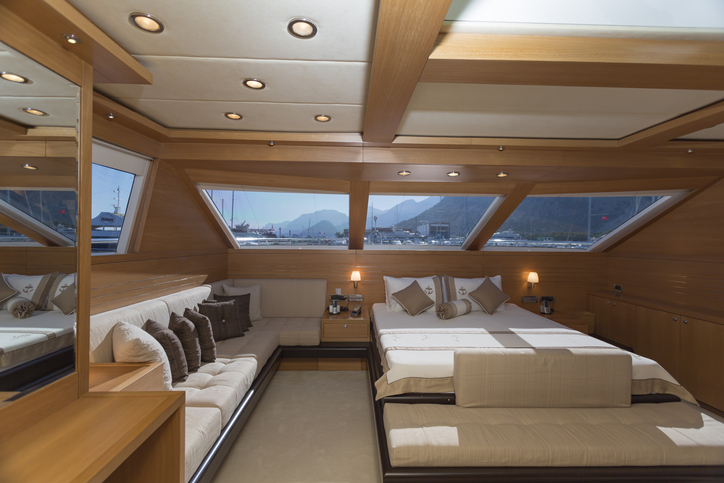Sometimes you just want to leave the workaday life behind and set out for an adventure on the high seas. If you have a boat, you can do exactly that. Take the plunge and push the world behind as you set sail for new shores. The endless horizon is where you are going. There is nothing you can’t do! Wait, there’s a little bit of preparation you should do first. This guide has some helpful tips for living aboard your houseboat.
Sail away with me
Obviously, the first thing you will need to live on a boat is a boat. Take a really good look at your boat to decide how long you can reasonably live on it by judging what is has for storage space. Can you fit the things you need? How about only the things you really need? If your boat doesn’t quite suit your living space needs, can you remodel it? You need to be sure you have enough room for the people living there as well as the things you will need to live. Your boat will need to be warm and dry with plenty of ventilation, especially if you plan to live there full-time.
Know your houseboat
This sounds obvious, but you really do need to be an accomplished sailor before you live aboard a boat for any length of time. Be sure you know all the parts of your boat so you can fix and maintain it. It is extremely important to have a boat that is kept in good repair and you will either have to do it yourself or know enough about it to accurately describe it to someone else. Supply and disposal systems in particular need a lot of maintenance. Practice using everything and take plenty of short sailing trips before you move to live on your boat.
Know your people
Living aboard your boat in a small space is something that needs total buy-in from everyone involved. Be absolutely certain that your partner is on the same page as you. If you live together in a very small space without even a chance to go for a walk to cool off, you’re going to need to share the same goals and motivation for sea living. Do you have the support of family members living on land or someone who will help you take care of things on that end? Having support for your dreams is important. Find an ally who will be on your side.
Accessorize!
In addition to having your crew and knowing all the parts of your boat, you also need to have all the accessories and equipment that goes along with it. This includes your sails, anchor, radio, first aid kit, and compass as well as tools for repairs at sea. Do you have flares and a satellite phone? How about Wi-Fi or a reliable way to contact land in any condition if you need to? Staying connected is important so that you have assistance if you need it and won’t become lost at sea.
Plan for expenses
You won’t necessarily save money by moving on to your boat. Even if your boat is paid off, remember you still have to pay moorage, boat insurance, waste and gas, as well as for food and water for yourself and any people living with you. Don’t forget to include these as well as have a fund for maintenance and repairs in your budget. You may need to update or adapt your boat for full-time living.
But where will you actually live?
Living onboard your boat is an exciting and unconventional choice no matter where you choose to moor, but your needs will vary if you plan to live at sea or live on your boat at a marina. If you choose to live on your boat moored at a marina, that will take the pressure off for things you need to have aboard while still offering the ability to spend your days sailing and cruising on the water. Plan for things like winters if the weather in your area isn’t boat-friendly, or take some shore leave during hurricane season.
Everyday living
Plan for the everyday living side of things. What do you cook with? Gas and electric are the usual methods for cooking onboard a boat, but you may have one method you prefer. Electric is generally better if you are able to connect to the power grid or generate your own electricity. Living on the coast is great as long as you are prepared. If you plan to live on your boat year-round and winter weather is chilly, make sure you have an on-board heating system. An electric heater works if you can generate your own electricity, or consider using a stove to spread heat.
Things to consider
As with any new venture, you can’t just jump in headfirst without some careful planning. Sail away to new shores on your yacht and set yourself free. Here are a few things to consider before you move on to your boat full-time.
Groceries
How much storage space do you have for the essentials and how much of that can be devoted to perishables? Plan your shopping for each voyage so you can be sure to have enough to eat. You can follow these cooking tips for eating on board.
Fishing
Fly fishing is gaining so much popularity. Living on the water can be a great opportunity to do a lot of fishing. Catching fish can be part of your grocery plan if you have a reliable catch.
Movement
Even calm waters are never perfectly still. Be prepared to be in constant motion even when you are not sailing anywhere. Pay attention to things in the interior that may need to be held in place to keep from being damaged with the constant movement.
Maintenance
Be sure to budget for the costs of maintaining your boat, which tends to be a little more regular than the costs of maintaining a home onshore.
Storage
Your boat is a relatively small living space, so be prepared to declutter your life and bring only the essentials on board with you. Smart storage space use will help you keep the things you need close at hand.
Navigating home insurance coverage for houseboats: A unique perspective
When we think of home insurance, traditional houses, and apartments typically come to mind. However, the concept of “home” has evolved, encompassing a diverse range of living arrangements, including houseboats. These floating dwellings offer a unique lifestyle, combining the tranquility of waterfront living with vessel mobility. But as with any home, houseboat owners need to consider the importance of insurance coverage to protect their investment and lifestyle.
The houseboat lifestyle:
Houseboats provide a distinctive way of living, offering picturesque views, a sense of freedom, and a connection to nature that’s hard to replicate in a conventional home. Houseboat communities can be found on rivers, lakes, and even coastal waters, allowing residents to embrace a serene and unconventional lifestyle.
Insurance considerations:
Owning a houseboat comes with its own set of challenges and risks. While houseboats offer a remarkable living experience, they also face exposure to unique hazards such as water damage, storms, collisions, and sinking. As a houseboat owner, it’s essential to understand the intricacies of insuring your floating home.
Types of coverage:
When it comes to insuring a houseboat, you’ll want to explore insurance options that cover both the vessel itself and the personal property inside. Here are the main types of coverage to consider:
- Hull coverage: This is similar to dwelling coverage in traditional home insurance. It protects the physical structure of your houseboat against damages caused by covered perils like storms, accidents, or collisions.
- Personal property coverage: Just like in a traditional home, personal property coverage for a houseboat protects your belongings on board. This can include furniture, electronics, appliances, and other items you have onboard.
- Liability coverage: Liability coverage is crucial, as it provides financial protection if someone is injured on your houseboat or if you accidentally cause damage to someone else’s property while on the water.
- Emergency assistance coverage: Given the mobility of houseboats, emergency assistance coverage can prove invaluable. It can cover expenses related to towing, mechanical breakdowns, and temporary housing if your houseboat becomes uninhabitable.
- Navigational area: Make sure to understand the navigational area covered by your insurance policy. Some policies might have restrictions on where you can sail or navigate, so it’s important to clarify these details.
Choosing the right policy:
Selecting the appropriate insurance policy for your houseboat requires careful consideration. The coverage you need will depend on various factors, including the type of houseboat, location, value of your belongings, and budget. It’s recommended to work with insurance professionals who specialize in watercraft and houseboat insurance to ensure you have adequate coverage tailored to your unique circumstances.
Houseboats offer an alternative lifestyle that combines the joys of living on the water with the comforts of home. Just like any homeowner, houseboat enthusiasts must prioritize insurance coverage to safeguard their investment against unexpected events. By understanding the specific risks associated with houseboat living and exploring comprehensive insurance options, you can enjoy the serenity of your floating home while having the peace of mind that comes with proper protection.
Tips for living on the sea
Living on the open water is absolutely an adventure and can be the perfect solution for those who crave a regular change of scenery, and you can experience the fun and thrill experience of deep-sea fishing. If you find it difficult to stay in one place, then living on your boat could be the solution for you. We have a few tips to keep in mind while you live out this dream.
- Make sure everything is clean. You’re not going to have space for any extra things getting in the way. A clean boat runs better and is easier to keep in good repair.
- You depend on the weather, so keep a close eye on the forecast and make sure you have the experience to deal with sudden changes in the conditions. Be prepared with your wardrobe, too. You will need clothing for rain and sun as well as hats and lots of sunscreen, as there isn’t much shade on the water.
- What to do if you have problems or get lost. Do you have a radio and are you able to have a connection to land? The importance of being able to reach help when you need it cannot be overstated. Keep your navigational equipment in good repair at all times and have a backup plan in case anything fails.
- Make it your own. Your boat is your houseboat and it is now your boat home. Decorate a little with some of your favorite colors and photos of friends or family. You live here now, so you may as well make it comfortable and feeling homey.
Find a community
Your daily life onboard the houseboat is going to change depending on your location. If you are still going to work on land while living at the marina, you will have a neighborhood of sailors nearby. This marina lifestyle is your starting point to build a knowledgeable community of friends and like-minded people around the waters. Plan ahead with your voyages and build connections with other sailors in marinas and seaside communities along the coast you plan to sail. If you plan on spending many of your days on the water and mooring at different places at night, be sure to plan ahead and book a spot, and know that you are expected in each place. This helps confirm that you have a place to moor and ensures your safety since you will be expected.
Sail the world
Even if your yacht is not going for a round-the-world trip, your boat home will take you to discover new coasts and see your own land from a new perspective. Living on a boat may not be the usual thing to do, but living aboard your own boat is your chance to sail the world without leaving home. When your boat is your home, the world is your oyster and you’re headed for new shores. Unfurl your sails and explore! The world’s coastline is waiting for you.




